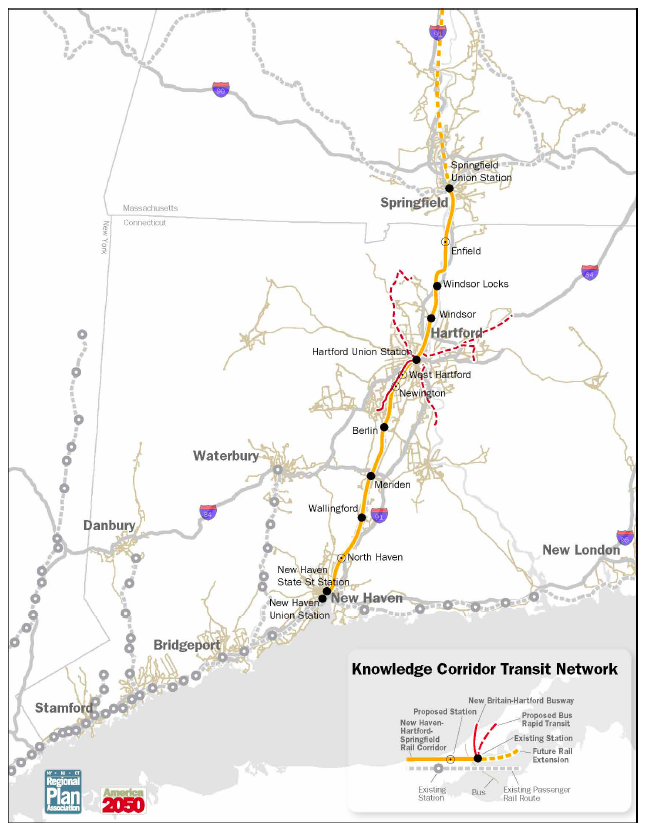AMERICA 2050 & REGIONAL PLAN ASSOCIATION
1. Executive Summary: Findings & Recommendations
In June 2011, Regional Plan Association and America 2050 organized a two-day workshop that convened key stakeholders in the Knowledge Corridor region. The goal of the workshop was to identify strategies to best leverage rail investments being made for greater economic growth.
Workshop Findings
Knowledge Corridor Region
Anchored by the Hartford, CT and Springfield, MA metropolitan areas, the “Knowledge Corridor” is a spatial economic framework developed in recent years to describe the Central Connecticut and Western Massachusetts region, emphasizing the concentration of colleges and universities in the region. The region also has a unique mix of knowledge-sector industries, such as insurance and financial services, health care services, aerospace and defense manufacturing, and more.
At the heart of the Knowledge Corridor runs the New Haven-Hartford-Springfield Rail Corridor, a major branch line of the Northeast Corridor, stretching from New Haven, CT through Hartford and north to Springfield, MA. This historic rail line connects a string of communities located along the Connecticut River Valley that are also linked by Interstate-91.
Knowledge Industries
Earlier economic studies of the region have emphasized the Knowledge Corridor’s concentration of higher education institutions and specialization in several knowledge-sector and related industries.
According to our analysis of employment levels, the Knowledge Corridor region has a greater share of its total employment in nine specialized knowledge-sector and related manufacturing industries when compared to the nation as whole. These industries include Firearms, Aerospace and Defense, Medical Device, Plastics, and Precision Manufacturing; Educational, Insurance and Financial, and Health Care Services; and Renewable Energy.
Rail Project
The State of Connecticut is currently pursuing the New Haven-Hartford-Springfield (NHHS) Rail Project, a major investment that will result in faster, more frequent, and more reliable rail service. The rail project entails adding a second track, upgrading existing stations and rail infrastructure including drainage, signals and communications, and at-grade crossings. Four new stations, as well as new train equipment will also be part of later phases.
When complete, the rail project will increase service frequency from 6 to 25 daily round-trips, increase speeds, and reduce travel times. The double tracking, track and signal system improvements will provide moderate reductions in travel times. However, the introduction of express trains will result in substantial travel time reductions for some origins and destinations. For example, express service from Hartford to New York City will reduce the current travel time from 2 hours and 30 minutes to 2 hours.
Download full version (PDF): Dependable Rail in 2016
The rail project is projected to take 1.5 million car trips off the road and eliminate 100 million miles of vehicle travel annually. State funding and federal grants have fully funded the first two phases and partially funded the third phase of this five-phase project.
About America 2050 www.america2050.org“America 2050 is a national initiative [in collaboration with Regional Plan Association] to meet the infrastructure, economic development and environmental challenges of the nation as we prepare to add about 130 million additional Americans by the year 2050. America 2050 is guided by the National Committee for America 2050, a coalition of regional planners, scholars, and policy-makers to develop a framework for the nation’s future growth.”
About Regional Plan Association
www.rpa.org
“Regional Plan Association is America’s oldest and most distinguished independent urban research and advocacy group. Now in its 86th year, RPA prepares long range plans and policies to guide the growth and development of the New York- New Jersey-Connecticut metropolitan region. RPA also provides leadership on national infrastructure, sustainability, and competitiveness concerns. RPA enjoys broad support from the region’s and nation’s business, philanthropic, civic, and planning communities.”
Tags: America 2050, Connecticut, CT, Knowledge Corridor, MA, Massachusetts, New York, NY, Regional Plan Association, RPA







 RSS Feed
RSS Feed